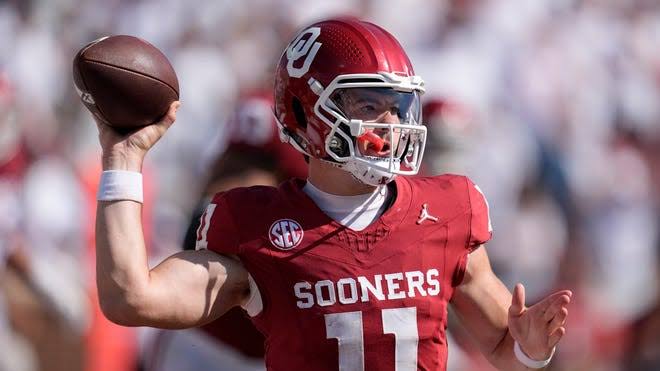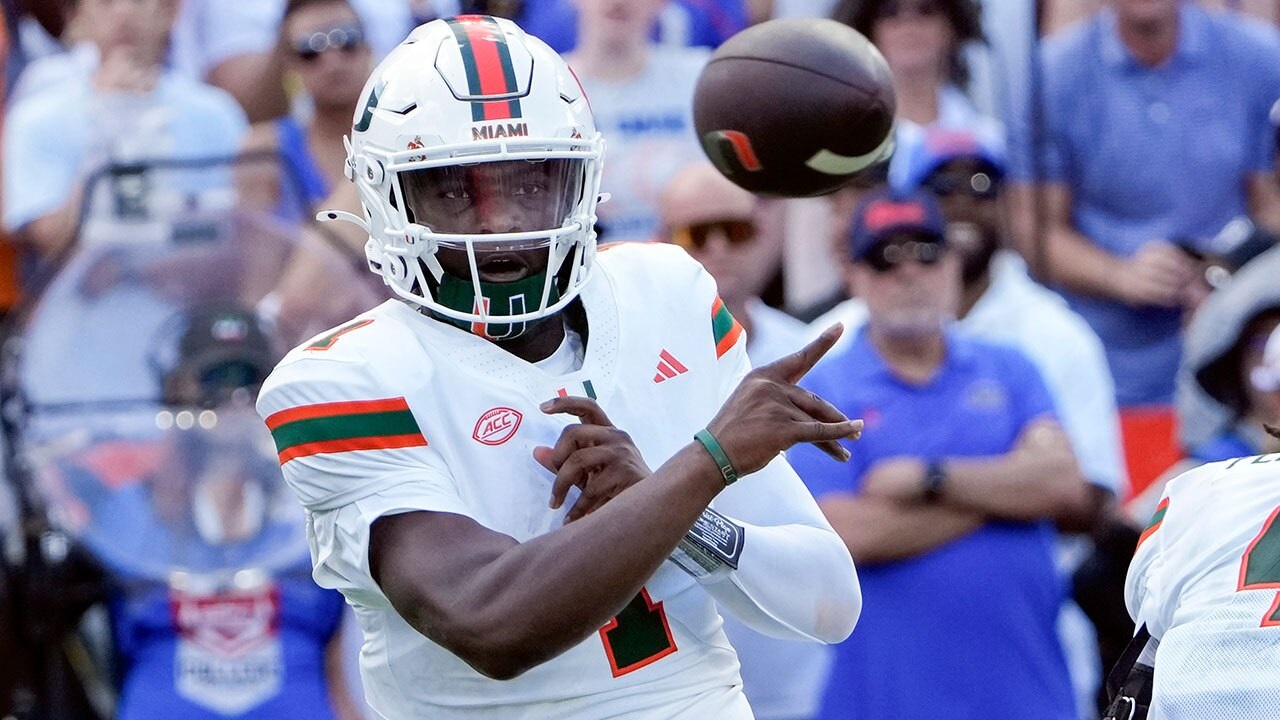Oklahoma Sooners Quarterback Jackson Arnold Suspended Two Games for Violating PED Policy…..
In a major shock to the college football world, Oklahoma Sooners quarterback Jackson Arnold has been suspended for two games after violating the NCAA’s performance-enhancing drug (PED) policy. This suspension, announced early Monday morning by the NCAA, has created an uproar in Norman, Oklahoma, where Arnold had quickly become one of the brightest young stars in college football. His unexpected suspension raises significant concerns, not just for the future of his career but also for the Sooners’ playoff aspirations this season.
The Details of the Suspension
The NCAA’s statement revealed that Jackson Arnold tested positive for a banned substance during a routine drug screening conducted in the wake of Oklahoma’s recent games. Although the NCAA has not disclosed the specific substance involved, the positive test result places Arnold under the category of a PED violation, which carries with it mandatory suspensions for any player found in violation. As a result, Arnold will miss the Sooners’ upcoming games against Kansas State and Texas Tech, which are critical contests for Oklahoma’s chances of securing a top spot in the Big 12 standings.
Under the NCAA’s PED policy, any player caught using performance-enhancing substances faces a minimum two-game suspension. The goal of these regulations is to maintain a level playing field in college athletics, ensuring that no player gains an unfair advantage by using illegal substances. Though the specifics of Arnold’s violation remain under wraps, the situation has led to widespread discussion about drug use in college sports and the pressure athletes face to perform at peak levels.
Reactions from the Oklahoma Football Program
The Oklahoma football program, which has long prided itself on its championship pedigree, was quick to respond to the news of Arnold’s suspension. Head coach Brent Venables expressed his disappointment with the situation but reinforced that the program adheres strictly to the NCAA’s policies on performance-enhancing drugs.
“We take full responsibility for upholding the integrity of college football, and that includes supporting the NCAA’s policies on PEDs,” Venables said in a statement. “Jackson is a talented player and has shown great promise, but he knows this is a serious issue, and we will support him in his efforts to learn and grow from this experience.”
Arnold’s teammates also weighed in, offering their support to their young quarterback while emphasizing the importance of accountability. Offensive lineman Drake Stoops, a senior and leader on the team, spoke at a press conference later that day. “We all know how much work Jackson has put in, and none of us are perfect. But we also understand the importance of maintaining discipline and following the rules,” Stoops said. “We’ve got his back, and we’ll make sure we keep pushing forward as a team.”
Arnold himself took to social media shortly after the announcement of his suspension, issuing an apology to his coaches, teammates, and fans. “I made a mistake, and I take full responsibility for my actions. I’ll use this time to reflect and improve. I can’t wait to be back with my teammates and continue working towards our goals,” Arnold wrote on his Twitter account.
While the situation is certainly a setback for Arnold, the Sooners must now focus on how to move forward without him in the lineup for the next two crucial games. The team is currently ranked among the top 10 in the nation, and any slip-up in the Big 12 could jeopardize their playoff aspirations.
The Impact on Oklahoma’s Season
The timing of Arnold’s suspension could not be more critical. With the Sooners sitting at the top of the Big 12 standings, their upcoming games against Kansas State and Texas Tech are pivotal in determining their postseason fate. Arnold had emerged as a key figure in Oklahoma’s offense, especially as a versatile backup quarterback who could provide a spark when needed. His absence means the Sooners will have to make adjustments to their offensive scheme, potentially forcing them to rely more heavily on starter Dillon Gabriel or backup quarterbacks like Jake Wolff.
Though Gabriel is an experienced and talented quarterback in his own right, the loss of Arnold, a highly-touted freshman, represents a blow to the Sooners’ depth at the quarterback position. With the Sooners facing a tough stretch of games in the coming weeks, the team will need to adjust quickly to ensure their championship hopes remain alive.
The suspension has also raised concerns about the long-term future of Arnold’s career. Despite his immense talent, this setback could cause recruiters, scouts, and fans to reconsider Arnold’s trajectory. While he is widely regarded as one of the top quarterbacks in the nation, this violation casts a shadow over his potential and serves as a reminder of the intense pressure athletes face in such high-stakes environments.
PED Use in College Sports: A Growing Concern
Arnold’s suspension also brings attention to the ongoing issue of performance-enhancing drugs in college athletics. The use of PEDs in college football has been a longstanding issue, though it often takes high-profile cases like this one to bring the problem into the spotlight. College athletes are under immense pressure to perform at their best, and for many, the temptation to take shortcuts—through PEDs or other means—can be overwhelming.
The NCAA has made efforts in recent years to crack down on PED use, implementing stricter drug testing protocols and penalties for players who test positive. While the majority of college athletes comply with the rules, incidents like Arnold’s serve as a stark reminder that drug use is still a concern in college sports. The consequences of such violations are severe, with suspensions, damage to reputations, and long-term impacts on a player’s career prospects.
In addition to the impact on the player involved, these violations also tarnish the image of the institution and the sport as a whole. For Oklahoma, this suspension serves as a cautionary tale about the importance of maintaining clean and fair play, as well as the need for continued vigilance in monitoring student-athletes’ behaviors and well-being.
Jackson Arnold’s Future: Can He Bounce Back?
While Jackson Arnold faces a challenging road ahead, this suspension does not necessarily mark the end of his promising career. He is still a young player with a great deal of potential, and many in the football community believe he can learn from this experience and come back even stronger.
Arnold’s first priority will be serving his suspension, but after that, he must prove to his coaches, teammates, and fans that he can overcome adversity. How he responds to this setback will be crucial in determining his future, both at Oklahoma and beyond. If he can demonstrate the discipline and maturity necessary to avoid further mistakes, Arnold could still have a bright future as one of the top quarterbacks in college football.
Moreover, his ability to overcome this challenge could enhance his reputation in the long run, showing that he is capable of handling setbacks with grace and resilience. For Oklahoma, having Arnold return to the field as a focused and disciplined player could be a critical factor in their efforts to compete for a national championship in the coming years.
Conclusion: A Setback, But Not the End
Jackson Arnold’s two-game suspension for violating the NCAA’s PED policy is a blow to both him and the Oklahoma Sooners football program. The timing of the suspension, coming in the midst of a crucial stretch of games, raises questions about how the team will perform without its young backup quarterback. Despite the setback, Arnold and his coaches have expressed confidence that he can bounce back from this difficult situation, learn from his mistake, and eventually resume his promising career.
For Oklahoma, this is a reminder of the need for discipline and vigilance in maintaining the integrity of college football. While the immediate consequences of the suspension are significant, the long-term impact on Arnold’s career will depend on his ability to respond to adversity and demonstrate his commitment to personal growth and responsibility.
In the meantime, the Sooners must shift their focus to the task at hand—winning their next two games and ensuring that their playoff aspirations remain intact despite the absence of one of their most promising young players.
This version of the article takes a broader approach, exploring the impacts of Jackson Arnold’s suspension on the team, the individual, and the wider world of college football, while reflecting on the key issues surrounding performance-enhancing drugs.


